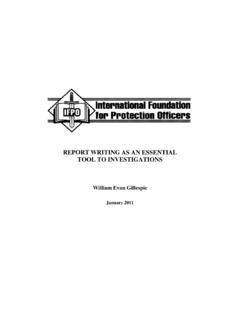Transcription of REPORT WRITING AS AN ESSENTIAL TOOL TO …
1 REPORT WRITING AS AN ESSENTIAL tool TO INVESTIGATIONS William Evan Gillespie January 2011 REPORT WRITING as an ESSENTIAL tool to Investigations 1 Any professional in the security industry, or anyone employed in the criminal justice system for that matter, is probably familiar with WRITING reports. If one hasn t had to write a REPORT yet, he or she will most likely have to write one at some point in their careers. WRITING reports isn t just a one and done occurrence. REPORT WRITING is absolutely ESSENTIAL to successful investigations and prosecutions. This paper will explore the purposes and importance of reports as well as provide tips for beginning REPORT writers to refine their skills.
2 There are negative implications to unskilled REPORT WRITING and may end up halting a person s career to a standstill. Although many of today s investigative reports can be completed in preformatted forms, there are still many scenarios in which one will not have this luxury. It is important to gain a thorough understanding of the purpose of REPORT WRITING and the uses behind it. Let s examine a few of the ways in which reports are utilized. 1. Accidents in the Workplace Incident reports are crucial for corporations and businesses, especially those that are open to the public. Retailers, for example, must be keenly aware of the safety risks that are involved.
3 With high traffic volumes, shelves and displays, potentially dangerous merchandise, escalators, etc., an accident is bound to happen, whether it is a customer or an employee. Filling out a thorough accident REPORT immediately after an accident takes place will save the employer a lot of hassle in the future should any medical or legal issues ensue from the incident. The REPORT can clear the employer of any liability in civil proceedings against the business. These reports are to be written by the individual responding to the scene of the incident. Worker s compensation and insurance fraud is a rapidly growing area of crime with the advancement of technology and the depressed economy.
4 Some employees will jump at the chance to exploit and abuse the system. WRITING a REPORT immediately after a workplace incident will lower the risk of worker s compensation or insurance fraud significantly. It can also alleviate the risk of civil liability should the employee decide to sue the employer afterwards. Employers who maintain an unsafe workplace riddled with safety hazards will find themselves embroiled in administrative fines and civil litigation. 2. Preliminary Reports Preliminary reports are commonly written by uniformed officers when responding to a complaint or a crime. When WRITING a preliminary REPORT , it should include any all information pertinent to the investigation .
5 This includes information on the individual making the REPORT or the victim, a thorough description or identification of the person making the complaint, details of the incident that transpired, and any other relevant information that can be collected. As Dempsey writes, the preliminary REPORT is like a birth certificate in a case because it begins the investigation (2002, 86). A follow up REPORT is later written to keep tabs on the progress of the investigation and include any new or relevant information gained. 3. Administrative and Managerial Entities The reports one writes throughout his or her career are almost always going to be viewed by third parties.
6 In almost all cases, administrative agencies and REPORT WRITING as an ESSENTIAL tool to Investigations 2 supervisors will require that subordinates submit regular reports for the purpose of reviewing progress of an investigation and keeping track of employee productivity. These are sometimes called supervisory review reports (Dempsey, 2002, 84) These reports, when done on a regular basis, help supervisors to keep track of subordinate productivity and the progress being made on all cases. 4. Chain of Custody and Lab Reports Evidence will change hands throughout the course of an investigation .
7 In this case, anyone who claims custody of the evidence must complete a chain of custody REPORT . The REPORT should include a detailed, chronological history of the evidence and should contain a detailed description of when and to whom it changed hands. If there are any discrepancies about the chain of custody, it will be hard to prove in court that the evidence shown at trial is the same that was collected at the crime scene. In this case, it is best to limit the transfer of evidence to as little as possible. Lab reports are written regarding any form of evidence that requires a laboratory examination. A request for a laboratory analysis is sent to the lab by the investigator.
8 The forensic analyst who conducted the analysis will then submit a REPORT detailing the results of that analysis. The United States Environmental Protection Agency (EPA) provides instructional courses on sampling procedures, data acquisition, chain of custody, what it is used for, and how the forms are properly used to pass testing samples from one link of the chain of custody to another. 5. Observations When assigned to conduct surveillance, a REPORT written by the investigator conducting the surveillance is called an observation REPORT . The REPORT details all actions that the investigator witnesses during the course of the investigation .
9 These are just a few of the many different kinds of reports the investigator may come into contact with throughout the course of his or her career! Tips on Investigative REPORT WRITING 1. Follow the Principle of Expansile Significance Minor crimes and inconsistencies often turn out to be major crimes or loss events. Minor is major ! (Gunter and Hertig, 2005). Get all the facts. This includes even the smallest of details. Even if it may seem irrelevant at the time, little pieces of information may manifest themselves as much more significant throughout the course of the investigation . 2. Write Professionally, but Not Pompously The REPORT you are WRITING won t just be read by people within your department or your field.
10 Don t assume that everyone will understand certain things you write in the REPORT , because it will only serve to confuse the readers and will damage your credibility. Keep the high-level vocabulary to a minimum and refrain from use of REPORT WRITING as an ESSENTIAL tool to Investigations 3 any lingo or vernacular language. Police talk may work on the beat between two partners, but it will not work in a formal REPORT . 3. Write Neatly and Concisely The more one writes reports, the easier it will become to spill the words out and get it right after a few tries. A good REPORT will consist of thorough, detailed information but will also be fairly brief and to the point.









